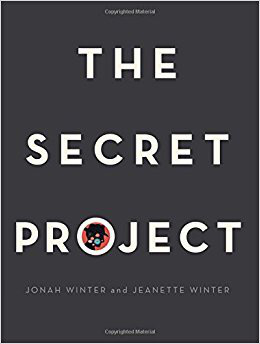In my experience, reading a Jin Yong novel often involves dropping the book and blubbering “what – what – what was THAT???!!!”
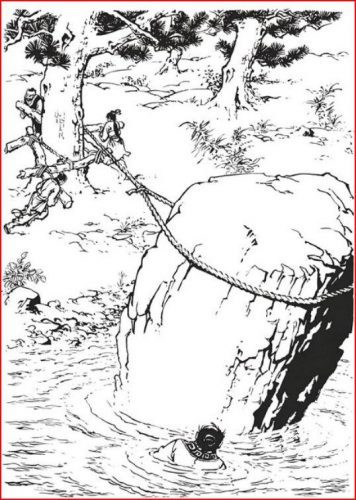
WHAT IS THIS??? WHAT IS GOING ON HERE???
Recently, I watched Zhang Jizhong’s adaptation of Ode to Gallantry. Even though that is the Jin Yong novel I have the least memory of, I could tell that the adaptation had a bunch of stuff which was not from the novel, but that was okay – anyway, since it’s on my mind, I’m taking my first example from this story.
There are these two martial artists from the Isle of Gallantry who, to put it mildly, scare the shit out of everybody, even the leaders of the most powerful martial arts sects. That’s because they travel around China every ten years, invite sect leaders to their island. Nobody who goes to the island has ever returned, and if the sect leader refuses, then the martial artist from Isle of Gallantry kills the entire sect, and nobody can stop them,
The story builds up the suspense by explaining that these two martial artists come from the Isle of Gallantry every year, oh and it’s been ten years since they last came around, and many martial artists are desperately scrambling with various strategies to avoid being taken to the Isle of Gallantry and/or killed, and so forth. There is even an alliance being formed to create a united front against the martial artists from the Isle of Gallantry.
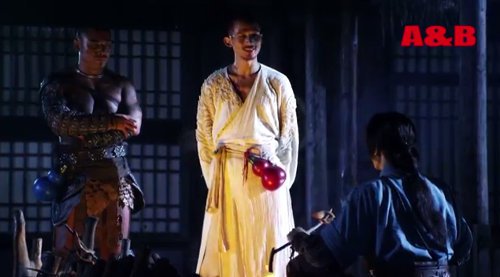
The guys from the Isle of Gallantry encounter the protagonist.
Naturally, the martial artists from the Isle of Gallantry eventually appear, and just as naturally, the protagonist – who of course is going to be mistaken for the leader of a major sect because plot – runs into them. What do you think happens next?
Jin Yong is very good at building the suspense, but so are a zillion other competent writers. This is not what sets Jin Yong apart – it is the way he delivers on the buildup which is special. If you haven’t guessed already what the protagonist – who often gets mistaken for a sect leader – does when he meets the Guys from the Isle of Gallantry, guess now.
You win if you guessed … that he becomes friends with them and sworn brothers, and drinks wine with them. Wait – what the heck??!!!
Becoming friends with the men from the Isle of Gallantry means that the protagonist is possibly safe from them, but once it gets known that he’s their sworn brother, well, that alliance against the Isle of Gallantry is going to target him.
Yes, Jin Yong will build up the suspense, getting the readers to anticipate whether A or B will happen, and finally, it’s neither A or B – it’s C. And option C is frequently ridiculous, but Jin Yong is talented at getting the reader to accept C without breaking the suspension of disbelief.
In my Rambling Series about Sexism in Jin Yong Stories, I mention the example of the protagonist killing his sweetheart as being misogynist. I am fairly certain that is intentionally there to shock readers. Generally, a sympathetic and righteous protagonist is not supposed to kill his sweet and loving romantic interest. However, though it is a shocking (and misogynist) plot twist, I bought into it as a reader – in other words, my suspension of disbelief remained intact.
Here are more examples of suspenseful buildups leading to surprising plot twists from various Jin Yong novels (I’m not citing the specific novels because these are very spoilery)
Example 1:
Buildup: To make a very, very, very long story short, there is a group which wants an order of Buddhist nuns to submit to them. The abbesses refuse on principle. Therefore, this group attacks the nuns to force them to submit. Out of all of the nuns’ “allies” the only one who helps them is the male and non-Buddhist protagonist with a reputation for being a lowlife (i.e. he loves drinking alcohol, which is forbidden by strict Buddhists, he enjoys having lustful thoughts about women, etc.)
Question: Will a) the abbesses, with the protagonist’s help, be able to survive and protect their order of nuns, or b) will they all be murdered, leaving the younger nuns without effective leadership and thus defenceless?
Answer: C. The last abbesses are murdered, and with their dying breath declare the male, lowlife, non-Buddhist protagonist as the leader of their order. The plot twist is actually more complicated than this, but I don’t think I can describe it succinctly. Suffice to say, having a lowlife male protagonist suddenly become the leader of a sect of nuns is a very WTF plot twist even without the extra details.
Example 2: (warning for sexual violence)
Buildup: Heroine secretly overhears Villain 1 giving Villain 2 a date rape drug so that he can rape her, and Villain 2 happily accepts it. When Villain 1 leaves, Heroine ambushes him, and then goes to the room where Villain 1 is to confront him. (And in an earlier scene in the novel, Villain 2 had beat Heroine in combat, so he is clearly a better martial artist)
Question: Will a) the Heroine succeed in confronting Villain 2 or b) will Villain 2 overpower her?
Answer: C. Villain 2 told Heroine that Villain 1 had given him the drug so that he could rape her, but that he would never use it that way. He lets Heroine throw the drug out the window, and she decides to trust him. (The reader knows that this guy is not trustworthy).
Example 3:
Buildup: Character 1 wants to kill Character 2.
Question: Will a) Character 1 succeed or b) fail, and possibly be killed by Character 2?
Answer: C
Character 1: I am going to kill you because you are [X].
Character 2: No, I’m not [X].
Character 1: You’re lying.
Character 2: No, I kidnapped [X], and I’ve been impersonating her for years.
Character 1: You’re a really bad liar.
Character 2: No, I’ll prove it to you.
[Character 2 shows Character 1 where she is keeping X in captivity]
Character 1: Wow, you weren’t lying. I’m not going to kill you.
(Coincidently, since all of the characters in this scene are female, it passes the Bechdel test.)
I actually began this post with a particularly elaborate and constructed technique Jin Yong uses to give readers their shocks. He also uses simpler techniques.
One technique is to simply have striking imagery, without any buildup. A villain demonstrates the potency of his poison by poisoning a shark and releasing it to the sea. The shark writes with pain before it finally dies. Other sharks come in and eat the dead shark, and then die of poison, and the sharks which eat those sharks get poisoned too, until the sea is filled with the floating corpses of dead sharks. Of course, though this image did not come with much build up, it is used as buildup for a later scene: when a character falls victim to this same poison, the reader knows just how much trouble he is in. His death is extremely painful. And when the crows descend to eat they flesh of his corpse, they all die too, thus he is reduced to being a skeleton amidst a flock of dead crows. (I think this is one of the most gruesomely spectacular death scenes I have found in fiction).
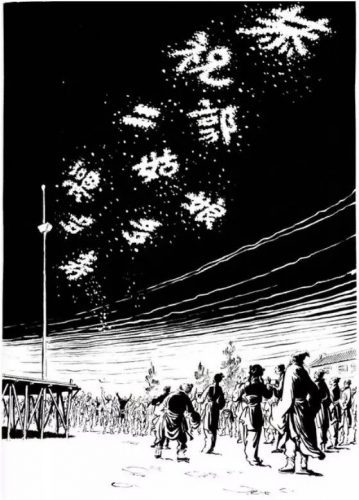
There is HAPPY BIRTHDAY!!!! (in Chinese) written across the sky.
Not that all of the bold imagery is violent. Someone prepares a birthday gift for a teenage girl – he arranges a series of fireworks to go up to write across the sky “Happy Birthday [name of teenager]!” And those fireworks also destroyed some of the fortifications of the birthday girl’s enemies – okay, a lot of the imagery is violent.
Of course, Jin Yong steals borrows a lot of this imagery from other sources. For example, the image of a man whose face is so handsome that he goes around wearing a mask to hide his handsomeness is clearly taken from the story of the Prince of Lanling.
As you can see, a theme in this striking imagery is hyperbole. It works.
However, it’s often not purely striking imagery – the context adds to the vividness of the scene. For example, one of the most famous moments in all of Jin Yong’s novel is when a woman plunges a sword into a man’s chest. While that is an interesting image in itself, what makes it memorable is that the man is the protagonist, and that he is in love with the woman and had not tried to defend himself because he had trusted her not to hurt him.
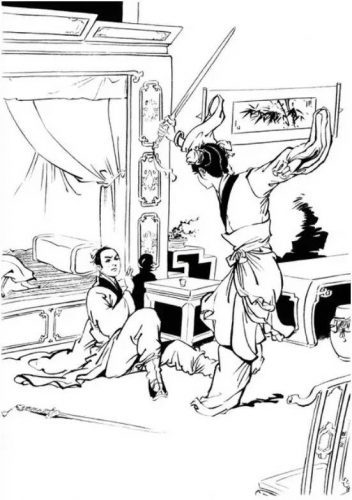
This is a *different* famous scene with a young woman menacing the protagonist with a sword. In this case, the protagonist does think the woman might actually hurt him because she is clearly super angry at him. Jin Yong ends this scene on a cliffhanger, so the reader does not find out what the young woman does with the sword until a later chapter.
Another example is when a protagonist is hidden under a layer of frost, so he looks like a snowman. Other sets of characters come in and say things they would not want the protagonist to here, unaware that he is right there. Finally, when a fight scene happens, he finally bursts out of the frost, so those characters realize that he was there the whole time *and* he overheard them.
Jin Yong is also extremely fond of relationship/identity-based reveals. He uses “Luke, I Am Your Father” many times, as well as ‘this person is actually the incognito emperor of China’ ‘this person is actually your sibling’ ‘this person is actually the incognito emperor of China AND your sibling’ (yes, Jin Yong has used that last trope).
There are some shock tropes which Jin Yong overuses – for example, I think there are too many mothers who commit suicide in front of their sons (quite a few fathers do it too, but the mother is more likely to do it because, in the Jin Yong universe, female life is not as valuable as male life). However, considering how long his novels are, the variety is still impressive.
This is one of the most famous scenes in Demi-Gods and Semi-Devils (w/ Eng subs) (rated R for violence) because it stacks an unusually high number of shock tropes, even by Jin Yong standards. When I was reading the novel, I felt that this scene was so over the top that I was laughing out loud. Nonetheless, because it packs in so many shock tropes, it is a good example of many of the things I discuss in this post.
Last year, I wrote this crossover fanfic about Emperor Kangxi (Jin Yong) and Emperor Gregor (Vorkosigan Saga). Even though the Vorkosigan Saga has plenty of shock tropes itself, one thing I noticed while writing the fic that it was easier for Kangxi to shock Gregor than vice versa because Kangxi is from a fictional universe with a higher level of what-the-f**kery going on.
To wrap things up, Jin Yong’s shock tropes push the readers closer to the edge of suspension of disbelief without (usually) pushing them over the edge (the characters go in a boat all the way to the Arctic Circle, and land at Fire-Ice Island, and stay there for ten years without any contact with the outside world, etc.) Because it is a region of the imagination which most storytellers will not send the readers, full of surprises, it feels fresh and new. And there are all the feels. And because it is so fresh, and surprising, and there are so many feels, it helps the reader feel more alive.
One of my favorite Jin Yong TV theme songs is “Up and Down a Challenging Road” (no, it’s not the most literal translation of the song title). Out of all the Jin Yong theme songs, I thing it best captures the spirit of the Jin Yong universe as a whole – reading a Jin Yong novel puts me on a ride full of jolts.
Advertisements Share this:



